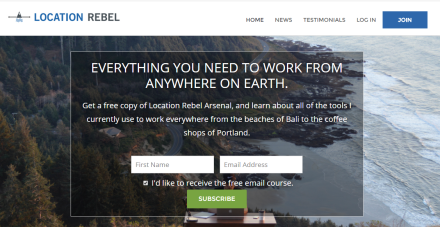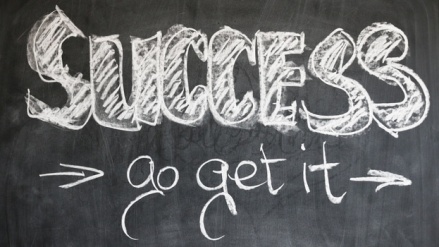
This week I “splurged” on an online course called Location Rebel, and since it was quite a big expense for me, I thought I’d track my progress going along, and let you know whether I find it to be value for money.
Background
I first became familiar with Sean Ogle’s Location 180 programme when one of his courses was advertised as part of a “Paradise Pack” through a language blog I read. Although I didn’t buy the Paradise Pack at that time, I signed up to the Location 180 mailing list and found the content quite interesting. For example, in some of the first emails you were asked to write down the answers to various questions. I liked that it took a more active approach, which is why I didn’t unsubscribe from the mailing list, and then read the sales email which came through.
Buying thought process
I first received an email saying that a 48-hour annual sale was coming up. It didn’t show a price, or list all of the bonuses which would be included, which I thought was a good strategy as it made me want to know more. In fact, I went to the website to try to read up on the sale, and as there was no information there, it made me more determined to look out for the email at the beginning of the sale. One of the pre-sale emails included a link to an interview with someone who had used the programme in the past, with good results. Although I’m not a fan of audio rather than written content, on that particular occasion I had time to play it in the background while I was doing other stuff on the computer. The successful person sounded like he had not had any special skills or business ideas when he started the programme, and had still been able to do well, so that was reassuring.
When the sale finally started, I clicked on a link which again, was well strategised. At the top of the page was a button you could click if you wanted to buy straight away, and below was a long list of what you’d get with your purchase. I clicked on the button just to check that the price wasn’t completely out of budget for me. At $497, it was on the high side, but not inconceivable. Since I wasn’t ruling it out completely, I went back and read through the list of purchases.
The main item was, of course, the Location Rebel course. The idea behind this is that you can learn how to set up a business which you can run from anywhere, enabling you to travel. That’s the main selling point for me. I’d like to earn more money to save towards early retirement, but I would definitely want to travel more if I’m not working full-time, so a traditional business which ties me to one location wouldn’t be of much use to me. The second selling point for me was the entrepreneur blueprints. These were advertised as step-by-step guides to start a business in a range of areas, such as SEO, web design or copywriting. They were framed as something which any sensible person could make a start in, without needing any special talents. I liked the sound of that, as a stumbling block for me when looking at other online courses and offers is the feeling that I don’t have anything to sell. In addition, since I currently have to do a little bit of website set-up and dissemination in my existing work, even if I never went ahead and started a business, these skills would make me better at what I already do.
I didn’t save the original link, so I don’t remember everything that was included, but the first 75 subscribers would also get:
- Three additional online courses (nice to have, but not major selling points for me at this stage)
- The Complete Beginner’s Guide to Lifestyle Entrepreneurship
- The Rebel’s Guide to Mastering Email
- Rebel Launches
- A site audit, redeemable at a date of your choosing (I don’t have a website yet, but it’s a bonus if I do set one up)
- Access to monthly phonecalls between Sean and two other mentors (as mentioned above, I prefer written to audio information, so I don’t know if I’ll use this. You can email questions in, so that might be useful)
- The possibility of winning an additional account for a friend or family member (I’m not sure who I would have given this to, so not a big selling point for me)
On top of that, the first 50 subscribers would get access to Copyhour, an online copy writing course. Although it wasn’t guaranteed, it was another point of favour for me, since I like writing and language, and so would like to learn what makes your writing more persuasive.
I think there were additional bonuses for the top 25 and higher, perhaps something like a call or meet-up with Sean Ogle? I can’t remember though, since I wasn’t that high in the list.
Another good sales strategy was that Sean boke down the course value. I must admit, when I see adverts for online courses and books with a retail price of $97 and offered today for the amazing low price of $19, I do tend to take the retail price with a pinch of salt, and assume it’s grossly inflated compared to how much a PDF or e-book cost to produce. What Sean did was highlight the expenses and experience he had which were leading him to charge this price, e.g. the cost of his degree, his business experience. This led to a complete reframing of the cost for me, which made me see $497 as much more reasonable than I had when I initially viewed it.
Ultimately, I bought the course because it looked interesting, it would teach me skills that I could use in my existing job, and it would give me a chance to earn money while travelling. So there would be immediate benefits, even if I never got as far as setting up a business. As I work through the course, I’ll write more updates so you can see how it’s working out for me.

 This month’s fun activities were:
This month’s fun activities were:



 I’ve recently been on a trip of just over two weeks for work. I flew with KLM, and checked-in baggage would have cost an extra £40 (at the discounted rate for booking in advance), so I wanted to travel with hand luggage only. Normally, when I travel for leisure, I travel for under seven days and always find it easy to travel with hand luggage and even have space in my suitcase for my handbag and a coat. Given that, I thought I’d be able to manage a longer trip.
I’ve recently been on a trip of just over two weeks for work. I flew with KLM, and checked-in baggage would have cost an extra £40 (at the discounted rate for booking in advance), so I wanted to travel with hand luggage only. Normally, when I travel for leisure, I travel for under seven days and always find it easy to travel with hand luggage and even have space in my suitcase for my handbag and a coat. Given that, I thought I’d be able to manage a longer trip.